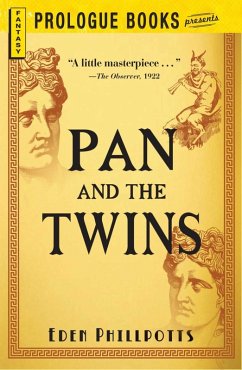
An Apology for the Life of Mrs. Shamela Andrews (eBook, ePUB)
Enriched edition. A Satirical Twist on Virtue and Deception in 18th-Century Fiction
Kommentar: Glover, Jillian / Redaktion: Good Press
Versandkostenfrei!
Sofort per Download lieferbar
1,99 €
inkl. MwSt.
Weitere Ausgaben:

PAYBACK Punkte
0 °P sammeln!
In "An Apology for the Life of Mrs. Shamela Andrews," Henry Fielding presents a brilliantly satirical response to Samuel Richardson's "Pamela." This early 18th-century novel employs a blend of humor and critical reflection to dissect the social constructs surrounding virtue and morality in a rapidly changing British society. Through the character of Shamela, Fielding reveals the complexities and contradictions inherent in the ideal of the virtuous woman, employing a prose style that is both engaging and incisive, reflecting the characteristics of early novelistic forms and the burgeoning genre...
In "An Apology for the Life of Mrs. Shamela Andrews," Henry Fielding presents a brilliantly satirical response to Samuel Richardson's "Pamela." This early 18th-century novel employs a blend of humor and critical reflection to dissect the social constructs surrounding virtue and morality in a rapidly changing British society. Through the character of Shamela, Fielding reveals the complexities and contradictions inherent in the ideal of the virtuous woman, employing a prose style that is both engaging and incisive, reflecting the characteristics of early novelistic forms and the burgeoning genre of satire. He cleverly constructs a narrative that allows for both social critique and personal reflection, making it a work rich in literary and historical context. Fielding, a prominent figure in the development of the English novel, was deeply influenced by the literary rivalries of his time, particularly with Richardson. His experiences as a playwright, and his interest in the ethical and moral questions of his day, informed his decision to create a sharp counter-narrative to Richardson's idealism. Fielding's adeptness at satire and understanding of character development are well exhibited in this work, as he seeks to expose the hypocrisy within the moral landscape of 18th-century England. This book comes highly recommended for readers interested in the evolution of the English novel and the interplay of gender and morality within literature. Fielding's wit and keen observation make "An Apology for the Life of Mrs. Shamela Andrews" an essential read for scholars and casual readers alike, inviting reflection on the tensions between societal expectations and personal truth. In this enriched edition, we have carefully created added value for your reading experience: - A succinct Introduction situates the work's timeless appeal and themes. - The Synopsis outlines the central plot, highlighting key developments without spoiling critical twists. - A detailed Historical Context immerses you in the era's events and influences that shaped the writing. - An Author Biography reveals milestones in the author's life, illuminating the personal insights behind the text. - A thorough Analysis dissects symbols, motifs, and character arcs to unearth underlying meanings. - Reflection questions prompt you to engage personally with the work's messages, connecting them to modern life. - Hand-picked Memorable Quotes shine a spotlight on moments of literary brilliance. - Interactive footnotes clarify unusual references, historical allusions, and archaic phrases for an effortless, more informed read.
Dieser Download kann aus rechtlichen Gründen nur mit Rechnungsadresse in A, B, BG, CY, CZ, D, DK, EW, E, FIN, F, GR, H, IRL, I, LT, L, LR, M, NL, PL, P, R, S, SLO, SK ausgeliefert werden.













